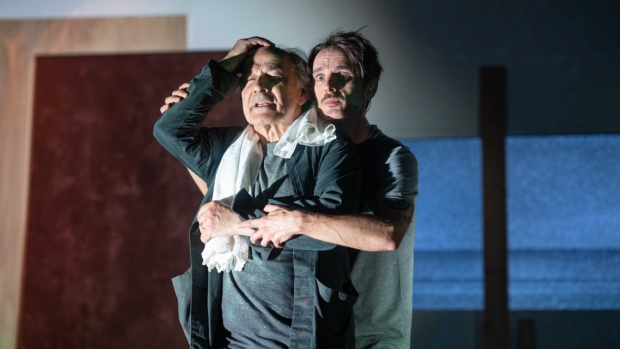The Tempest at Ustinov Studio – review
Artistic director Deborah Warner helms the new production in her inaugural season in Bath

© Hugo Glendenning
It seems a fitting tribute that in the week we lost the mighty Peter Brook, a different theatrical explorer began her reign in Bath. Under previous artistic director Laurence Boswell, the Ustinov Studio played host to a string of shows that hit big nationally and internationally. For a few hot years in the mid-2010s, it was arguably the most exciting theatre in the country. The new boss in charge, Deborah Warner, is changing up the programme. We are promised classical plays, adaptions from novels, fully-staged song recitals, dance, and at least one full opera a year. It explores what theatre can be – something you'd expect the maestro sitting in his pantheon to nod sagely at.
The Tempest is a strong opening statement. It's theatre loaded with imagination, alive and messy, and alone that places the actor at the heart. What Warner does very quickly here is to show us what to expect of her reign. Years of creative exploration find a home in this studio theatre in cozy Bath.
Not that she manages to get to grips with all of the challenges Shakespeare's late valediction play possesses. The opening lengthy exposition scene that lays out all the key players and their place in Prospero's story still stretches time intermittently and the final release of Ariel feels oddly muted. What she does manage is to bring all the disparate strands together into one cohesive vision and most excitingly bring a real sense of magic to the play while also stripping it back to feel elementally theatrical.
The core creative team of designer Christof Hetzer, lighting designer Jean Kalman, sound designer and composer Mel Mercier, and video designer Torge Møller bring a European aesthetic to its look. A white sterile set that floods with golden light, which is desecrated with mud and liquid, and whose projections at one point provide a jump scare worthy of Blumhouse, it is minimalist in design and maximalist in execution. If you want to see world-class theatremakers engage in fringe theatre methods, this is the show.
Nicholas Woodeson is a mishmash of a Prospero, terrifying as the revenging sorcerer, twisting and turning his puppets, but muted in his forgiveness. He, alongside the rest of the cast, speaks the text beautifully, the metre and iambic observed and riffed, but he is not the dominant figure. Instead, it's Dickie Beau's Ariel and Edward Hogg's Caliban that become the heart of Warner's vision. Lip syncing performance artist Beau is particularly magical as Ariel, his eyes dead but calibrating his mouth and face so the sprite takes a multitude of voices though his persona remains trapped in the firm grip of his master. We first encounter Hogg's Caliban flinging faeces at his captors, and it's a fully committed performance capturing both the wildness of the original native and the voice of the romantic when he feels he may, at last, have some freedom. The sympathies in this production are for those who find their homes invaded and overrun by outsiders.
Tanvi Virmani makes a promising debut as Miranda, her wide-eyed joy at seeing other human life being sweetly matched by Pierro Niel-Mee as a slightly bumbling but endearing Ferdinand. Warner has assembled a veritable smorgasbord of character actors to play the various courtiers and clowns of Milan who find themselves washed ashore. In particular, Finbar Lynch's inscrutable Antonio and Stephen Kennedy and Gary Sefton's clownish double act are fascinating mirrors in the minimalist/maximalism framework this show possesses.
It ends with Shakespeare's goodbye speech extolling the virtues of creating and entertaining an audience. It works almost as well as a statement of intent of what its audience can expect moving forward. The Ustinov, under Warner, may be about to land on another golden period.












